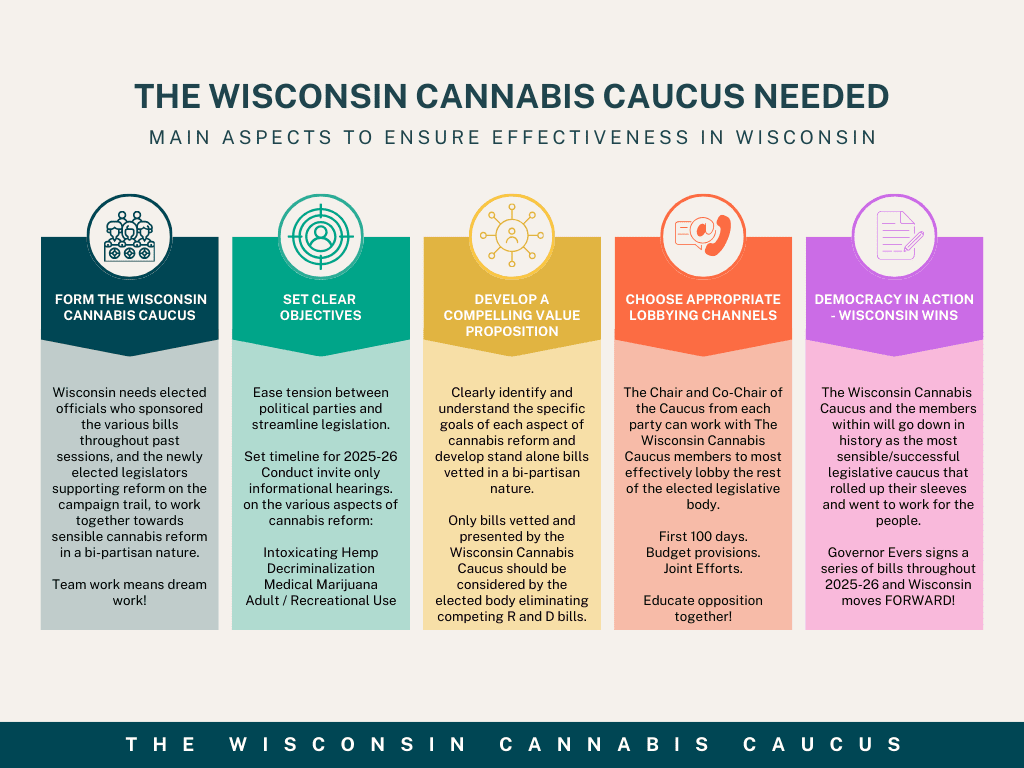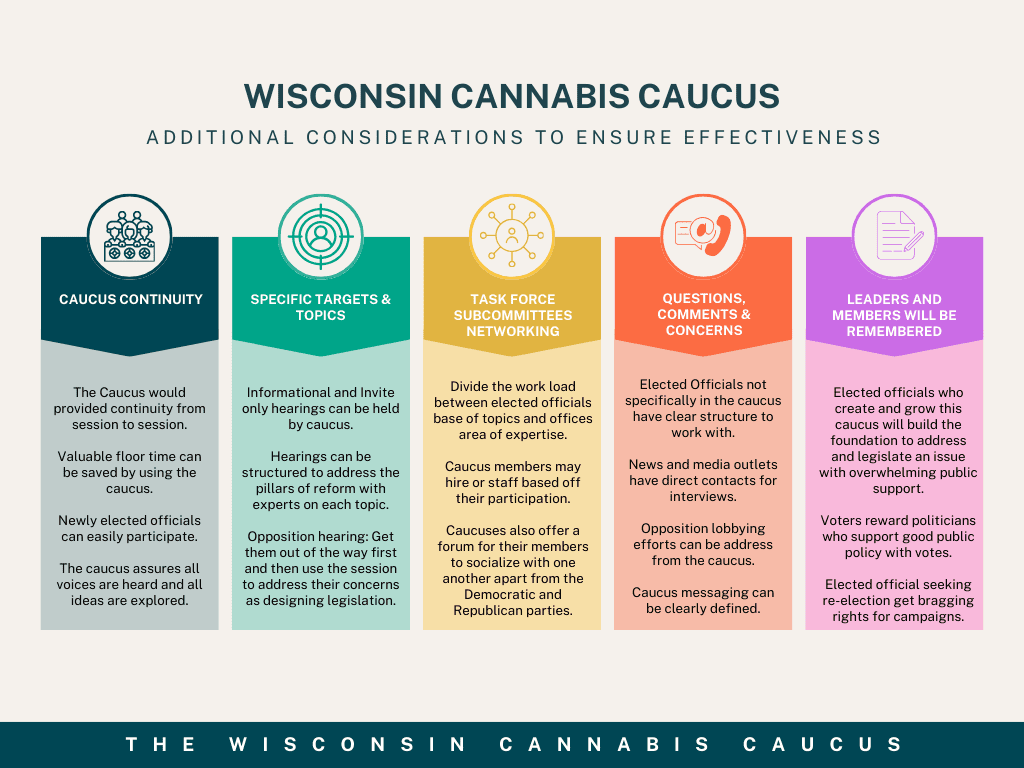Help select the potential leaders of The Wisconsin Cannabis Caucus
Wisconsin Elected Officials 2025-26
Wisconsin State Senate
Republican Senators
1 Julian Bradley (New Berlin)
2 Rachael Cabral-Guevara (Appleton)
3 Dan Feyen (Fond du Lac)
4 Mary Felzkowski (Tomahawk)
5 Rob Hutton (Brookfield)
6 Jesse James (Thorp)
7 John Jagler (Watertown)
8 André Jacque (De Pere)
9 Chris Kapenga (Waukesha)
10 Devin LeMahieu (Oostburg)
11 Howard Marklein (Spring Green)
12 Stephen Nass (Whitewater)
13 Romaine Quinn (Cameron)
14 Rob Stafsholt (New Richmond)
15 Patrick Testin (Stevens Point)
16 Cory Tomczyk (Mosinee)
17 Van Wanggaard (Racine)
18 Eric Wimberger (Green Bay)
Democratic Senators
1 Tim Carpenter (Milwaukee)
2 Kristin Dassler-Alfheim (Appleton)
3 Dora Drake (Milwaukee)
4 Jodi Habush Sinykin (Whitefish Bay)
5 Dianne Hesselbein (Middleton)
6 LaTonya Johnson (Milwaukee)
7 Sarah Keyeski (Lodi)
8 Chris Larson (Milwaukee)
9 Brad Pfaff (Onalaska)
10 Melissa Ratcliff (Cottage Grove)
11 Kelda Roys (Madison)
12 Jeff Smith (Brunswick)
13 Mark Spreitzer (Beloit)
14 Jamie Wall (Green Bay)
15 Robert “Bob” Wirch (Pleasant Prairie)
Wisconsin State Assembly (2025–2026)
Republican Assembly Representatives
1 Scott Allen (Waukesha)
2 David Armstrong (Rice Lake)
3 Tyler August (Walworth)
4 Elijah Behnke (Chase)
5 Mark Born (Beaver Dam)
6 Lindee Brill (Sheboygan Falls)
7 Robert Brooks (Saukville)
8 Calvin Callahan (Tomahawk)
9 Alex Dallman (Markesan)
10 Barbara Dittrich (Oconomowoc)
11 Bob Donovan (Greenfield)
12 Cindi Duchow (Delafield)
13 Ben Franklin (De Pere)
14 Nate Gustafson (Fox Crossing)
15 Joy Goeben (Hobart)
16 Chanz Green (Grandview)
17 Rick Gundrum (Slinger)
18 Karen Hurd (Withee)
19 Brent Jacobson (Mosinee)
20 Dean Kaufert (Neenah)
21 Dan Knodl (Germantown)
22 Joel Kitchens (Sturgeon Bay)
23 Scott Krug (Rome)
24 Rob Kreibich (New Richmond)
25 Tony Kurtz (Wonewoc)
26 Dave Maxey (New Berlin)
27 Paul Melotik (Grafton)
28 Clint Moses (Menomonie)
29 Dave Murphy (Greenville)
30 Jeffrey Mursau (Crivitz)
31 Amanda Nedweski (Pleasant Prairie)
32 Adam Neylon (Pewaukee)
33 Todd Novak (Dodgeville)
34 Jerry L. O’Connor (Fond du Lac)
35 William Penterman (Hutisford)
36 Kevin Petersen (Waupaca)
37 Jim Piwowarczyk (Hubertus)
38 Treig Pronschinske (Mondovi)
39 Jessie Rodriguez (Oak Creek)
40 Shae Sortwell (Two Rivers)
41 John Spiros (Marshfield)
42 Patrick Snyder (Weston)
43 David Steffen (Howard)
44 Rob Summerfield (Bloomer)
45 Rob Swearingen (Rhinelander)
46 Paul Tittl (Manitowoc)
47 Travis Tranel (Cuba City)
48 Duke Tucker (Grantsburg)
49 Ron Tusler (Harrison)
50 Nancy VanderMeer (Tomah)
51 Robin Vos (Rochester)
52 Chuck Wichgers (Muskego)
53 Robert Wittke (Caledonia)
54 Shannon Zimmerman (River Falls)
Democrat Assembly Representatives
1 Karen Kirsch (Greenfield)
2 Sylvia Ortiz‑Vélez (Milwaukee)
3 Priscilla Prado (Milwaukee)
4 Darrin Madison (Milwaukee)
5 Sequanna Taylor (Milwaukee)
6 Russell Goodwin (Milwaukee)
7 Robyn Vining (Wauwatosa)
8 Angelito Tenorio (West Allis)
9 Kalan Haywood (Milwaukee)
10 Supreme Moore Omokunde (Milwaukee)
11 Margaret Arney (Wauwatosa)
12 Ryan Clancy (Milwaukee)
13 Christine Sinicki (Milwaukee)
14 Deb Andraca (Whitefish Bay)
15 Joe Sheehan (Sheboygan)
16 Karen DeSanto (Baraboo)
17 Maureen McCarville (DeForest)
18 Brienne Brown (Whitewater)
19 Ann Roe (Janesville)
20 Clinton Anderson (Beloit)
21 Joan Fitzgerald (Fort Atkinson)
22 Randy Udell (Fitchburg)
23 Andrew Hysell (Sun Prairie)
24 Jenna Jacobson (Oregon)
25 Lee Snodgrass (Appleton)
26 Lori Palmeri (Oshkosh)
27 Angelina Cruz (Racine)
28 Tip McGuire (Kenosha)
29 Ben DeSmidt (Kenosha)
30 Greta Neubauer (Racine)
31 Vincent Miresse (Stevens Point)
32 Angela Stroud (Ashland)
33 Francesca Hong (Madison)
34 Renuka Mayadev (Madison)
35 Shelia Stubbs (Madison)
36 Lisa Subeck (Madison)
37 Mike Bare (Verona)
38 Alex Joers (Middleton)
39 Ryan Spaude (Ashwaubenon)
40 Amaad Rivera‑Wagner (Green Bay)
41 Jodi Emerson (Eau Claire)
42 Christian Phelps (Eau Claire)
43 Steve Doyle (Onalaska)
44 Jill Billings (La Crosse)
45 Tara Johnson (Town of Shelby)
###
Wisconsin needs elected officials who sponsored the various bills throughout past sessions and the newly elected legislators supporting reform on the campaign trail to work together towards sensible cannabis reform in a bi-partisan nature.
During election cycles, we need to put the pressure on candidates to help form The Wisconsin Cannabis Caucus if elected.
jay
An official bipartisan state caucus can streamline cannabis reform legislation at the state level while developing and promoting sensible cannabis policy reform and work to ease the tension between political parties.
The Wisconsin Democrat Caucuses include: Asian American Pacific Island Caucus, American Indian Caucus, Black Caucus, Disability Caucus, Environmental Caucus, Jewish Caucus, Labor Caucus, Latino Caucus, LGBTQ+ Caucus, Progressive Caucus, Rural Caucus, Veteran Caucus and Women’s Caucus.
There are Wisconsin Republican Caucuses also, aren’t there?
Bipartisan Wisconsin Caucuses include: Wisconsin Children’s Caucus, Wisconsin Paper Caucus, Wisconsin Legislative Trails Caucus and Wisconsin’s Legislative Sportsmen’s Caucus.
At the federal level there are hundreds of issue based caucuses:
There are some examples of bi-partisan caucuses also, such as: State Mental Health Caucus, Congressional Rural Health Caucus, Congressional Sportsmen Caucus, Senate Mental Health Caucus in the U.S. Senate
and our favorite federal caucus, The Congressional Cannabis Caucus.
What is next?
If Republicans insist on discussing cannabis policy solely behind closed doors within their own ranks, that is one challenge. However, another pressing issue is the stark division within the GOP itself. On one side, there are Republicans pushing for a complete ban on intoxicating hemp products, while on the other, there is an equally significant faction advocating for some degree of cannabis reform. This internal conflict reflects the broader uncertainty within the party on how to address the issue.
It has become painfully clear that Speaker Robin Vos is not interested in advancing cannabis reform in any meaningful way. Instead of governing and fostering collaboration, Vos has positioned himself as an arbiter, effectively stalling progress. His refusal to work with Democrats on this critical issue underscores his unwillingness to lead in a way that reflects the will of the people or the evolving needs of Wisconsin.
Despite these obstacles, there remains a clear path forward for legislators who genuinely care about cannabis reform. To break through the gridlock and foster bipartisan cooperation, it is essential to establish a Wisconsin Cannabis Caucus. This dedicated, cross-party group could serve as a platform for lawmakers committed to crafting and advancing policies that reflect the realities and opportunities of cannabis regulation. By forming such a caucus, pro-reform legislators can work together to ensure that cannabis policy becomes a priority in 2025 and beyond, transcending partisan politics and addressing the issue in a way that benefits all Wisconsinites.






